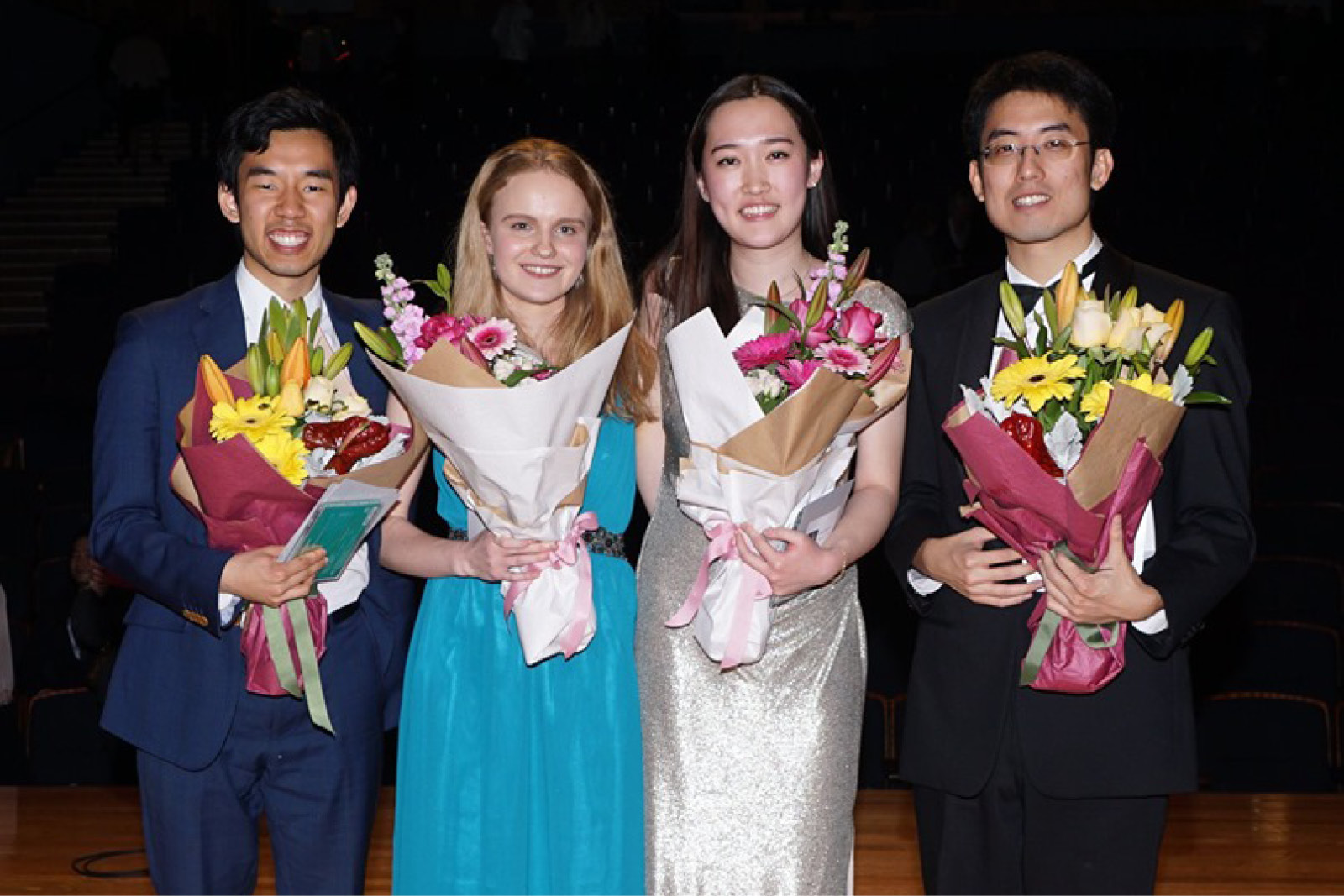Just as plants must have sunlight to flourish ambitious pianists need opportunities to perform. Such occasions can be informal, formal or highly pressured as in an exam or a competitive context. Many competitions are controversial for a variety of reasons and there’s certainly an associated brutality known only too well by professional musicians. For it doesn’t matter a jot how brilliantly an instrumentalist performed a week ago, yesterday or today because the jury’s judgements are based solely on how well an entrant plays in-the-moment. Some argue competitions promote conformity, conservative interpretation and discourage risk. However, winning a prestigious competition, such as Queensland’s Lev Vlassenko, is still an important signifier in an emerging soloist’s career.
 Finalists Anthony Chen, Ruby Luck, Leanne Jin and Oliver She. Photo © Lev Vlassenko Piano Competition
Finalists Anthony Chen, Ruby Luck, Leanne Jin and Oliver She. Photo © Lev Vlassenko Piano Competition
Four worthy pianists, Oliver She, Leanne Jin, Ruby Luck and Anthony Chen made it to the finals in which each performed a blockbuster concerto with the Queensland Symphony Orchestra. These performances were directed by the authoritative and on occasions, necessarily forgiving and adaptive baton of Melbourne-based conductor Richard Davis.
Oliver She presented Prokofiev’s flamboyant and notoriously tricky Third Concerto Op. 26 in C Major and he was the most experienced contestant having performed professionally with the Queensland and Sydney Symphony Orchestras. He acquitted Prokofiev’s fiendish technicality admirably and revelled in the composers’ sparkling episodes in the piano’s upper reaches. In relishing the mercurial textural shifts from the spiky and provocative to the plaintive, She is a phenomenal player. Yet, the performance lacked risk and stopped short of celebrating Prokofiev’s brilliant, uncompromising vision for the concerto template.
Jin’s choice was Rachmaninov’s Variations On A Theme of Paganini and she lovingly essayed the work’s virtuosic excursions. The audience warmed to her deep engagement, her flair for travelling the keys at treacherous speed, her capacity to soar as a soloist and yet blend with the orchestra intelligently. If there was a fleeting moment of ensemble imprecision, her insightful, persuasive and refreshingly un-self-conscious performance more than compensated.
Rachmaninov’s Second Piano Concerto has been portrayed as an “over-orchestrated behemoth,” whether this is a fair assessment or not, it’s a favourite piano-fuelled staple conveying drama, nostalgia and emotional intensity all communicated through Olympian virtuosity. Luck, the third contestant was heroic, she showed remarkable promise with her superbly rendered technical flurries and she brokered a lovely sound. On this occasion, her achievement was inconsistent and required more generous and imaginative shaping.
The last candidate presented Ravel’s popular Concerto in G. Chen’s impressive performance won the QSO’s prize for best soloist. Probably because he paired well with the orchestra and proved to be extroverted and sure-fingered in exploring Ravel’s jazzy, syncopated language and he enjoyed every moment. It was an authentic reading especially in the first and last movements although there was scope in the second for greater tenderness.
This was a long, yet enjoyable evening. Jin won the $25,000 prize money and She came a close second. While the jury deliberated, four remarkable young players, Rio Sato, Michelle Zhou, Edmund Hu and Kai Hasham charmed the crowd with exemplary performances of pieces by Grieg, Albéniz and Schumann.











Comments
Log in to join the conversation.